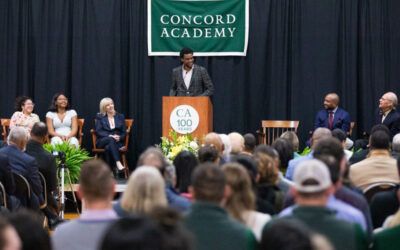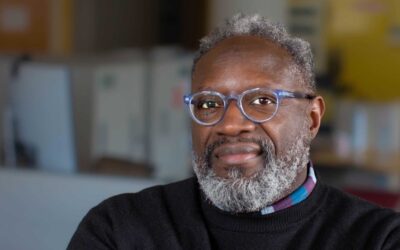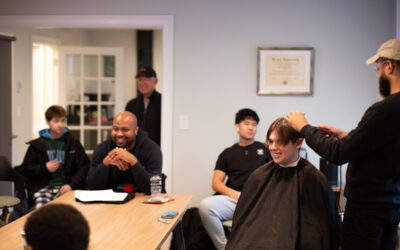“Digging Shelters” (Written and performed by Neil Halstead)
Good morning, everybody. Welcome to this opening chapel for 2020–21, the first of two chapels that I give each year at the start of each semester. While this “virtual” chapel is not taking place where it ordinarily would, for obvious reasons, I am grateful for the opportunity to speak to you today. From here on out, three and sometimes four days a week, seniors will offer their chapels, and their stories will weave the narrative of this year. Like you, I look forward to listening to their wisdom, their humor, and their accounts of their lives so far.
Before I begin, I want to take a moment to thank the members of the senior class. These seniors are being asked to do something that no class before them has been asked to do — to lead in the midst of a pandemic, and to do so, at least for the time being, away from campus and all that is familiar. Yet they are already showing us that they are up to the task, and I know that, no matter what this year will hold for us, we will count ourselves lucky that the class of 2021 was here to help lead CA.
I am going to give a talk in two parts today. Linking these two parts is a bit of a leap, but I hope you will indulge me.
Part 1
For nearly 40 years, I have lived on a school campus. It is a marvelous way of life, to be part of such a community, to share a neighborhood with young people from around the world, as well as a group of adults who are young at heart. To stroll on these paths in the evening, with the lights on the quad casting a warm glow, the sounds of laughter and conversation in the air, is a joy. (And let me say here to our students, particularly our boarding students: We will get you back here as soon as we can. This school is not the same without you.)
I plan to be at this school for some time yet, but I have begun to plan for life after CA. Last spring, I bought a flat in Charlestown, where I intend to live someday. Since then, I’ve been gradually outfitting the place, and doing a few projects to pass the time and make it my own. For instance, the previous owners had mounted a large, flat-screen television on the living room wall, and they had “left” it there for me. It was huge, measuring nearly 6 feet wide, and it dominated the entire room, which was not large to begin with, so I resolved to take it down. Somehow I managed to detach it from the mounting bracket, and more importantly, managed not to drop and shatter it, though it was incredibly heavy and difficult to maneuver. I made a mental note for a future “freecycle” opportunity. I repaired the several large holes left when I removed the mounting bracket, and then repainted the wall. Very satisfying is a freshly painted wall. Work is sometimes its own reward, I have found.
I especially like projects where I can immediately see the results of my efforts — washing a floor, weeding a garden, stacking a cord of firewood — and that may be why I gravitated to a career in school. A school, in one sense at least, is a place where one can learn how to do things: to read closely, to form an idea, to write a good sentence — and being part of the process of learning is gratifying. Granted, it’s not always easy — human beings can be pretty complicated, after all — but on balance it’s worth it.
My next project was to refinish two tables — a dining table made of solid cherry and a matching coffee table — that I had bought perhaps 35 years ago, and that were beginning to show their age. Both were pockmarked with dents and scratches — the dining table, for instance, had a very interesting round scratch, the result of a guest opening a bottle of wine by turning the bottle rather than the corkscrew — and I resolved to bring them back to as close to their original beauty as I could.
The finish actually seemed quite good, for the most part, so I decided to repair the dents using a steam iron (place a damp, folded towel on the dent and press the hot iron into it; do this a couple of times and the dents will be much less noticeable) and then sand to remove the scratches. I sanded to what seemed a smooth finish, then used a tack cloth (cheese cloth made sticky by beeswax) to wipe away any dust. I applied thin coats of polyurethane, lightly sanding and tacking between coats, a process called “filming,” for the very thin film of finish you apply each time. But the more coats I added, the worse the finish looked. Rather than allowing the beautiful cherry grain to emerge, it was as if each coat made the wood look artificial, as it were not wood at all. This clearly was not working, so I made the only decision I could make: I started over.
This time, I decided to remove the finish entirely, both the finish I had applied, as well as the original finish applied by the craftsperson who built the tables. I used a chemical stripping liquid to remove the finish, painting a thick coat on the wood, then waiting about 30 minutes before scraping off the gooey residue. Several rounds of this finally revealed the original wood beneath all those layers, a fine, smooth grain with a combination of light red and dark brown lines and whorls. This is what I would have missed if I had simply “settled” for the imperfect, vaguely artificial finish that the first attempt gave me. I was tired but pleased that I had decided to start over.
That project put me in mind of a former professor of mine, Bruce Guernsey, who taught first-year composition at the University of New Hampshire. I had never had a teacher like him. Bespectacled and seemingly mild of disposition, he became animated and bracingly direct when it came to critiquing student work. The first time I had one of my pieces workshopped, I got a pretty clear sense for how an egg feels when it’s dropped into a hot frying pan. But Professor Guernsey taught me much of what I know about how to write well, and perhaps the most important lesson was this one: If a piece of writing is not right, there is no use trying to convince yourself that it is. Sometimes you simply have to have the courage to tear up all those pages and start again.
Starting over is scary and risky, and it’s also liberating and utterly necessary sometimes.
Part Two
Yesterday, in her Convocation remarks, Laura Twichell ’01 asked all of us to be “present” in this place, as well as in the history of this place; she noted that the Concord Academy campus sits on the original homelands of the Massachusett people, and she invited us to “sit” in humility and responsibility for that history.
Laura then posed a question: What does this situation ask of us? What is asked of us as members of this community? What is asked of us as citizens of this country? As citizens of the world?
This is a troubling time. We are in the midst of a terrible pandemic, and we have seen catastrophic loss of life in the U.S. and across the world. Every day, we hear racist rhetoric employed casually by irresponsible leaders, and we see violence that pits citizen against citizen. Everywhere we look, we see human needs unmet, despite plentiful resources to meet those needs.
What does this situation ask of us?
Starting a project over and tearing up a piece of writing to begin again, both are actual and also metaphorical. Both require one to recognize the truth, that things are not right and will not turn out right no matter how we wish they would; and both require making a new start, no matter how hard that will be. That’s what this moment feels like to me — starting over.
At this moment, I could simply focus on civic duty — being aware of issues, exercising my vote, and supporting causes I care about — but I think this situation asks more of me.
I have thought a lot about that question for many months now. What does it mean for me to sit in humility and responsibility? What if I examine my own attitudes about gender, about class, and especially about race? What will I find? And what then must I do?
I spent time this summer reading a good deal and examining my own attitudes, particularly those about white privilege, and I have had many discussions about its effects; I say this not to demonstrate how enlightened I am. That is far from accurate. I say this to acknowledge that despite my role as head of this school, I have so very much to learn. I am trying to do that.
I have thought about the advantages that whiteness has given me, advantages that came to me without my even being aware: the freedom to travel anywhere in the country, anywhere in the world, and to assume that everyone has the same freedom; the security of seeing white people in leadership roles and not questioning that power structure; the ability to treat status as a reflection of merit, rather than race; the opportunity not to see what I do not wish to see. These are freedoms that are not earned, but simply granted, and I need to sit with them. And then, if I can, I need to give them up.
As a friend of mine often says, this is a moment that I cannot ignore, and it is a moment that perhaps is seeing others reacting the same way. Over the last six months, there has been a growing reckoning of the nation’s history of racism, and not just for past injustices, but for those occurring in the present. For instance, “district attorneys in three U.S. cities — Boston, Philadelphia, and San Francisco — announced in early July that their cities would form ‘Truth, Justice, and Reconciliation Commissions.’ (This information is from an article by Chris Cannito, writing for Nonprofit Quarterly.) The goals of these commissions are to atone for past injustice, to reshape the legal system to recognize and support all people, and to build trust, which is at the core of community, at the core of society.
Commissions such as these are one way to advance the work of reconciliation, but there are certainly others, whether that is re-naming public buildings or re-imagining public spaces, offering reparations, or directing tax dollars in an equitable fashion. Besides such efforts, which we can collectively acknowledge, I think there is work that individuals can do; I believe that this work belongs to each of us, and I would ask every member of our community to consider what you can do to contribute to this effort. Doing so, I think, starts with the willingness to try.
As the head of this school, I sometimes feel that I have to have all the answers and to get everything right all the time. That’s an impossible standard. What is not impossible is to make a commitment: I will do my best to sit in humility and responsibility; I will do my best to make this community better, to recognize and support all of its members. I will do my best to acknowledge my mistakes, and to take steps to repair them. That’s my commitment.
Starting over is still progress, after all — and it most certainly is not starting from nothing. In making the call to begin again, you do so from a place of understanding and, as I said before, courage. That is a good deal more than nothing.
Here’s to a good first day of classes. Thank you for listening, everyone.
“Both Sides Now” (Written and performed by Joni Mitchell)


